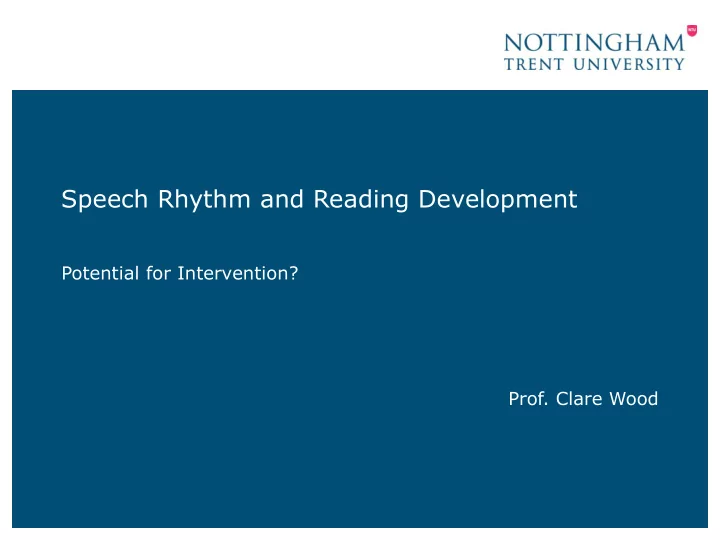

Speech Rhythm and Reading Development Potential for Intervention? Prof. Clare Wood
Overview • The Big Question • The Links between Speech Rhythm and Reading Difficulties • Speech Rhythm Activities in the Early Years • Supporting Children with Early Reading Difficulties 29 June 2018 2
The Origins of Reading Difficulties …and the Big Question 29 June 2018 3
The Origins of Reading Difficulties Early • Vocab Language • Chopping Phonological speech Awareness into units • Mapping Alphabetic Letters to Skills Sounds • Processing Orthographic Common Processing Letter Strings 29 June 2018 4
Lots of resources for teaching phonics… 29 June 2018 5
Learning to Read… • Teaching children to read accelerates phonological awareness – But it can be developed without formal tuition (Wood & Terrell, 1998; Wood, 2004) • And there are a group of children in every intervention study who fail to show the ‘expected’ progress 29 June 2018 6
A treatment resister… 29 June 2018 7
The Big Question • Why do some children struggle to acquire phonological awareness, despite years of being taught the alphabetic principle? • Child-Directed Speech and the Periodicity Bias – Mary had a little lamb – Ma-ry had a li-ttle lamb – S-W S W S-W S – Mary / had a / little / lamb 29 June 2018 8
29 June 2018 9
Rhythm Carries Meaning George had a red truck. • George had a red truck. • George had a red truck. • George had a red truck. • George had a red truck . • • CON-vict vs con-VICT • RE-cord vs re-CORD • Sarcasm etc 29 June 2018 10
Can you read the words in red? The coffee has chosure. It is chosureful. The stranger was perlextric. He was full of perlextricity. 29 June 2018 11
Stress is Linked to Morphology • Happy HAPP-y • Happiness HAPP-iness • Magic MAG-ic • Magician ma-GI-cian • Some suffixes make stress ‘shift’ 29 June 2018 12
The Links Between Speech Rhythm and Reading Difficulties
Sensitivity to Speech Rhythm and Reading 29 June 2018 14
29 June 2018 15
A tentative model Periodicity Bias Speech Rhythm Sensitivity Spoken Word Recognition Vocabulary Phoneme Identification Rhyme Awareness Phonemic Awareness Reading Spelling 29 June 2018 16
Speech Rhythm is Just Rhythm, Right? • They are related (weakly) to each other • Speech rhythm sensitivity can account for unique variance in reading scores after sensitivity to non-speech rhythm has been controlled for. • Non-speech rhythm cannot explain reading performance after speech rhythm sensitivity has been taken into account. 29 June 2018 17
To put it another way… Reading Speech Rhythm Ability Non- Speech Rhythm 29 June 2018 18
Summary of key findings • Holliman, Wood & Sheehy (2010b) – Speech rhythm sensitivity can predict reading development a year later • Holliman, Williams, et al. (2014) – Stress, intonation and timing are separable elements of speech rhythm • Holliman, Mundy et al. (2014) – Speech rhythm contributes to reading indirectly in 5-7 year-olds, via vocabulary / morphology and rhyme – segmental phonology less important • Holliman et al. (2017) – Speech rhythm is an important predictor of multisyllabic word reading in children aged 7-8 after controlling for PA, MA, vocab and memory • In short, speech rhythm appears to be an important but relatively neglected area of reading development theory 29 June 2018 19
So What? • Speech rhythm is implicated in the development of reading-related skills • Individuals with reading difficulties are also characterised by difficulties in speech rhythm sensitivity. • Can speech rhythm awareness be trained? • If is can, does it transfer to reading skills? 29 June 2018 20
The Intervention Studies
Speech Rhythm Activities in the Early Years • Harrison et al (2018) – Journal of Research in Reading • Reception children assessed on – Single Word Reading; Phonological Awareness; Vocabulary – Speech Rhythm Sensitivity • Three treatment groups: – New Speech Rhythm-Based Intervention – A Traditional Phonological Intervention – A Control (maths-based) Intervention • 10 Week Intervention Period 29 June 2018 22
Compound Nouns Task: 1 • Which set of pictures goes best with what you have heard? • Set 1: • Set 2:
Compound Nouns Task: 2 • Which set of pictures goes best with what you have heard? • Set 1: • Set 2:
Other Activities Mispronunciations Task • Intonation Detection (Question or Statement) • Taking a sentence from a book or poem and seeing if the child can • correctly select a word that is a good rhythmic ‘fit’ for that sentence – “Slinky Malinki was blacker than black, – a stalking and lurking… – (a) adventurous cat, (b) scary cat, or (c) misbehaving cat” 29 June 2018 25
Immediate Post Test Performance 29 June 2018 26
Delayed Post Test Performance 29 June 2018 27
Supporting Children with Reading Difficulties • Year 3 children - 6 months or more below expected level – Single Word Reading – Reading Comprehension – Phonological Awareness – General Intelligence – Speech Rhythm Sensitivity • Control group received semantics training 29 June 2018 28
Immediate Post Test 29 June 2018 29
Delayed Post Test 29 June 2018 30
What happened next…
29 June 2018 32
Rising Stars 29 June 2018 33
29 June 2018 34
“This isn’t about ditching or replacing our phonics teaching, but adding to and evolving it…It’s a highly credible approach that will change the way you teach.” 29 June 2018 35
Thank you! – British Academy – Andy Holliman – Leverhulme Trust – Emily Harrison – Social Sciences and Humanities Research – Luisa Tarczynski-Bowles Council of Canada – Sarah Critten – Rising Stars – Lesly Wade-Woolley – The Open University – Lindsey Heggie – Coventry University – Ellie Clin – Nottingham Trent University – Gareth Williams – Janet Vousden – Julia Carroll – Helen Breadmore 29 June 2018 36
Recommend
More recommend